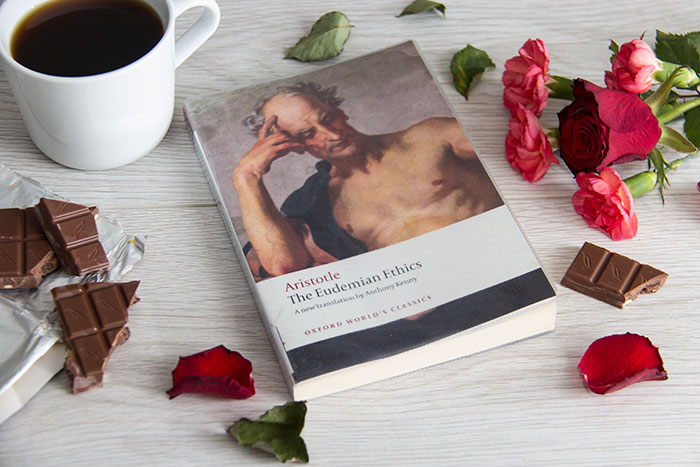The Eudemian ethics by Aristotle
The Eudemian ethics by Aristotle, translated by Sir Anthony Kenny. Instead of a book review, I’m going to share the quotes from the book that I found most interesting and/or intriguing. I’m going to share them how they appear, by books.

Book I. Happiness the Chief Good
“Everyone who has the power to live accordingly to his own choice should set up for himself some object for a noble life – whether honour, or reputation, or wealth, or culture – with a view to which he will govern all his conduct, since not to have one’s life organized with reference to some end is a mark of great folly.”
“Different people call different people happy”
“Want of culture is precisely the inability to distinguish between arguments that are appropriate, and those that are inappropriate.”
Book III. The Moral Virtues
“If someone, having it in his power to do noble things and abstain from base things, does just the contrary, it is evident that he is not a virtuous man.”
Book IV. Justice
“Justice is the state that makes a just person do just deeds out of choice.”
“What is just for a slave-owner or a father is not the same as justice between citizens, even though it resembles it; because there can be no injustice towards things that are one’s own.”
Book V. Intellectual virtue
“There is no choice without intelligence and thought or without a moral state of character.”
Book VI. Continence and Incontinence. Pleasure
“A man who believed in what he was doing would cease to do if he was persuaded out of his belief; but this man does it all the same though he is convinced he should not.”
“Knowledge alone does not make a person wise; he has to act on it.”
Book VII. Friendship
“Another problem is whether what we love in a friend is the pleasant or the good.”
“To make a friend takes time; initially there are only would-be friends. This condition is most easily mistaken for friendship, for when people are very anxious to be friends, they render each other all kinds of friendly services and this makes them pass for real friends rather than would-be friends.”
“The friendship between father and son is not the same as that between husband and wife, for the latter is between ruler and subject, and the former between benefactor and beneficiary.”
“An activity is more desirable than its product.”
“And mothers love their children more than fathers do, because they are more likely to regard the children as more their own work. For people judge work by its costs, and the mother suffers more, in childbirth.”
“The friendship of man and wife is one of utility, a partnership; that of father and son is like that between god and man and between benefactor and beneficiary, and the same as that in general of natural ruler and natural subject.”
Book VIII. Virtue, Knowledge, Nobility, and Happiness.
“A human being is by nature a compound of superior and inferior, and everyone accordingly should conduct their lives with reference to the superior part of themselves.”
The Eudemian ethics by Aristotle
Details about the picture: –
My rating: 5/5 Stars.
Would I recommend it: yes
Published by: Oxford University Press
Year it was published: 2011
Format: Paperback
Genre(s): Non-fiction. Philosophy.
Pages: 195
About the author: Aristotle was one of the greatest philosophers of antiquity. He was born in 384 BCE in Stagira, northern Greece. His father was a doctor at the court of Macedon. He starts his studies in Athens at Plato’s Academy in 367 BCE. Plato dies in 347 BCE and Aristotle leaves Athens. He will travel to Asia Minor and marry.
In 342 BCE, Aristotle will start tutoring Alexander the Great, son of Philip II of Macedon. A few years later, Philip II becomes master of the Greek world after defeating Thebes and Athens. Two years later his son will succeed him. Aristotle will return to Athens in 335 BCE. There he founds his own school, Lyceum. His wife dies and he will live with his slave-mistress. Aristotle will have a son with her, Nicomachus. After the death of Alexander in 323 BCE he will leave Athens.
He wrote two treatises on ethics, The Eudemian ethics and The Nicomachean Ethics. Aristotle died in 322 BCE at Chalcis in Euboia.
Sir Anthony Kenny is an Emeritus Fellow of St. John’s College, Oxford. He was a Master of Balliol College and Pro-Vice-Chancellor at Oxford. He was President of the British Academy.
Website & Social Media Links: –
